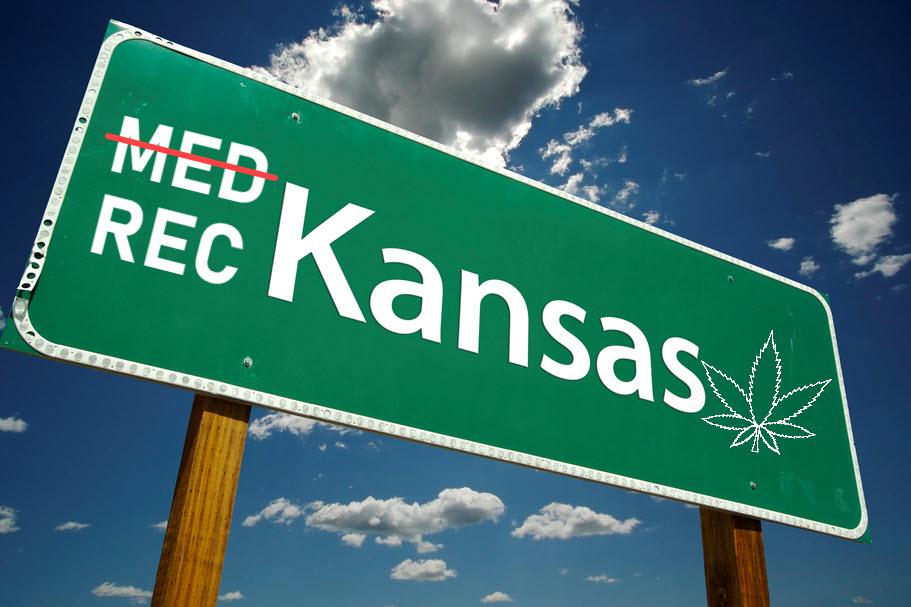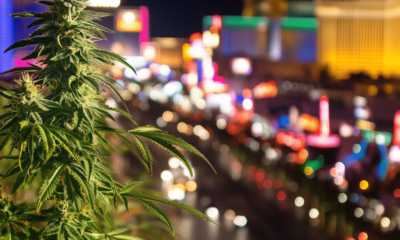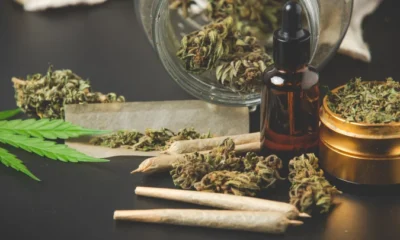Cannabis News
Skip Medical and Just Go Straight to Recreational Cannabis?
Published
4 months agoon
By
admin

The conversation around cannabis legalization is heating up in Kansas. Recently, Debbi Beavers, a top state official, suggested that it might be “easier” for lawmakers to legalize recreational marijuana rather than starting with a medical cannabis program. This statement has ignited discussions about the implications of such a shift in policy. In this article, we’ll explore the potential benefits and challenges of legalizing recreational marijuana in Kansas and the broader context of cannabis legislation in the state.
Current Landscape of Cannabis Legislation in Kansas
Kansas has long maintained strict laws against marijuana use. While many states have embraced legalization either for medical or recreational purposes Kansas remains one of the few states without any form of legal cannabis. This resistance is rooted in cultural attitudes, political opposition, and concerns over public health and safety.
Despite its conservative stance, there’s a growing movement advocating for cannabis legalization in Kansas. Polls show that public support for legalizing marijuana is on the rise, with many residents recognizing the potential economic benefits and social justice implications. However, legislative efforts have often stalled, particularly concerning medical marijuana.
Why Legalize Recreational Marijuana?
-
Simplifying Regulations
One of Beavers’ key points is that legalizing recreational marijuana could create a more straightforward regulatory framework than starting with a medical program. Establishing a medical system involves complex regulations regarding patient eligibility and product safety. In contrast, recreational legalization could streamline these processes by creating universal regulations for all adult users.
-
Economic Benefits
Legalizing recreational marijuana could significantly boost Kansas’s economy. States that have legalized cannabis have reported substantial increases in tax revenue. For instance, Colorado generated over $1 billion in tax revenue from cannabis sales since legalization in 2014. Kansas could benefit similarly, directing funds toward education, infrastructure, and public health initiatives.
-
Job Creation
The cannabis industry is also a burgeoning source of employment opportunities. Legalizing recreational marijuana would create jobs in agriculture, retail, and distribution, stimulating local economies and providing much-needed employment in areas with high unemployment rates.
-
Social Justice Considerations
Legalization also raises important social justice issues. The War on Drugs has disproportionately affected marginalized communities, leading to high incarceration rates for non-violent drug offenses. Legalizing recreational marijuana could help address these disparities by reducing arrests and convictions related to cannabis use.
-
Expungement Initiatives
Many states that have legalized recreational marijuana have implemented Expungement initiatives to clear the records of individuals previously convicted of cannabis-related offenses. Such measures could provide relief to those negatively impacted by past drug policies and promote equity within communities historically affected by harsh drug laws.
Challenges to Legalization
-
Political Resistance
Despite the potential benefits of legalizing recreational marijuana, significant political resistance remains. Many lawmakers hold conservative views on drug use and may be hesitant to embrace any form of legalization. Concerns about how legalization might affect public health and safety also persist.
-
Public Health Concerns
Opponents often cite potential public health risks associated with increased access to marijuana. These concerns include impaired driving, youth access to cannabis products, and potential long-term health effects on users. Addressing these issues through public education campaigns and responsible regulatory measures will be crucial if Kansas moves forward with legalization.
-
Regulatory Challenges
While Beavers argues that recreational legalization may simplify regulations, establishing an effective system will still pose challenges. Lawmakers must consider licensing requirements for growers and retailers, product safety standards, taxation rates, and marketing restrictions.
-
Balancing Interests
Finding a balance between promoting a thriving cannabis market and ensuring public safety will require careful planning and collaboration among stakeholders. Engaging law enforcement agencies, public health officials, and community organizations will be essential in crafting effective regulations that address diverse interests.
The Influence of Neighboring States
-
Regional Pressure for Change
Kansas is bordered by several states that have legalized either medical or recreational marijuana. As these neighboring states expand their cannabis markets—such as Colorado’s robust recreational system. Kansas lawmakers face increasing pressure to take action on their own policies.
-
Economic Competition
The economic benefits enjoyed by neighboring states may serve as a catalyst for change in Kansas. If residents travel across state lines to purchase legal cannabis products from states like Colorado or Missouri (which recently legalized medical marijuana), Kansas risks losing out on potential tax revenue and economic growth opportunities.
Shifting Public Opinion
Growing Support for Legalization
Public opinion regarding cannabis legalization has undergone a remarkable and dramatic transformation over the past few years. Recent polling data reveals that nearly 60% of Kansans now express support for the legalization of recreational marijuana, marking a significant increase compared to previous years. This surge in support not only highlights a shift in societal attitudes toward drug use but also reflects a broader recognition of the potential benefits associated with legalization, including economic growth, job creation, and social justice reforms. As more individuals become aware of these advantages, it is clear that the conversation around cannabis is evolving, paving the way for a more progressive approach to drug policy in the state.
Advocacy Efforts
Advocacy groups have played a crucial and transformative role in shifting public opinion regarding cannabis legalization by actively raising awareness about the numerous benefits associated with legalizing marijuana and addressing the various misconceptions that persist around cannabis use. These organizations have undertaken extensive efforts to organize campaigns specifically designed to educate voters about not only the economic advantages that legalization can bring—such as increased tax revenue and job creation—but also the significant social justice implications connected to cannabis reform, including the need to rectify past injustices related to drug enforcement policies. Through their initiatives, these groups aim to foster a more informed public discourse on the topic, ultimately paving the way for meaningful legislative change.
Conclusion
The proposal to legalize recreational marijuana in Kansas presents a significant opportunity for the state to simplify its regulatory framework, boost its economy, and address social justice issues, all while responding to growing public support. However, navigating the challenges of political resistance and public health concerns will be essential. By fostering open dialogue among lawmakers, advocacy groups, and community stakeholders, Kansas can craft a responsible cannabis policy that not only aligns with changing public sentiment but also sets a precedent for effective governance in an evolving landscape of drug policy reform.
KANSAS GOES GREEN, BUT NOT SO FAST, READ ON…
THE 2 REPUBLICANS BLOCKING MMJ IN KANSAS FOR 300,000 PEOPLE!
You may like
-


3 best THCA vape carts of 2025 by Leafly
-


From client to co-founder, Storz & Bickel executive on US tour to drum up cannabis business
-


UNDERSTANDING CANNABIS AND CANNABINOIDS (THC and CBD)
-


High Stakes and High Demand: Will Las Vegas Finally Allow Cannabis Near Casinos?
-


Cannabis Tourism in 2025: Destinations, Trends, and Tips
-


The Rise of Cannabis in Florida
Cannabis News
America is Rethinking Marijuana Legalization
Published
2 days agoon
March 1, 2025By
admin

Rethinking Marijuana Legalization: A Response to the National Review
Cannabis legalization has swept across America in waves, creating a patchwork of policies that vary dramatically from state to state. Some jurisdictions embrace full recreational use, others permit medical applications only, while some maintain total prohibition. This inconsistent legal landscape makes it nearly impossible to accurately measure the success or failure of legalization efforts. Without uniform policies and implementations, any cost-benefit analysis becomes murky at best.
In this fragmented environment, opinions about cannabis legalization remain sharply divided. Some celebrate newfound freedoms and opportunities, while others lament perceived social costs and unintended consequences. The National Review recently published an opinion piece questioning whether we should reconsider marijuana legalization altogether, citing several issues they believe undermine the case for legal cannabis.
Today, I’m going to examine these claims with a critical eye. While I agree that we absolutely should “rethink” marijuana legalization, my conclusion differs dramatically from the National Review’s perspective. Rather than retreating from legalization, I believe we need to push forward with more comprehensive reforms that address the legitimate concerns while delivering on the promised benefits.
The current half-measures and regulatory inconsistencies have created a situation where neither prohibitionists nor advocates are satisfied with the outcomes. Only through thoughtful, evidence-based policy adjustments can we realize the full potential of legalization while minimizing downsides. So yes, let’s rethink marijuana legalization – but let’s make sure we’re using all the available data and considering the root causes of any implementation problems.
The National Review piece relies heavily on arguments from Manhattan Institute Senior Fellow Steven Malanga, who suggests legalization has failed to deliver on its promises. The article highlights several key complaints:
-
The pervasive smell of marijuana in public spaces
-
Failure to eliminate black markets
-
Disappointing tax revenue that sometimes requires taxpayer subsidies
-
Increased usage rates contrary to predictions
-
Health concerns, particularly regarding psychosis
-
Perceived connections between cannabis and “social breakdown”
Let’s tackle these points one by one:
The Smell: While cannabis odor can be noticeable, this concern fundamentally misunderstands the concept of liberty in a diverse society. If someone is consuming cannabis in their private residence or in designated areas, their personal choices shouldn’t be criminalized simply because others find the smell unpleasant. Just as we accommodate cigarette smokers in designated areas and don’t ban cooking pungent foods, cannabis consumption can be managed through reasonable time, place, and manner restrictions. The development of cannabis social clubs, similar to cigar lounges, would further localize any odor concerns.
Black Markets:
The persistence of illicit markets isn’t a failure of legalization itself but rather of its incomplete implementation. Black markets thrive precisely because cannabis remains federally illegal, creating banking restrictions, interstate commerce prohibitions, and excessive regulatory burdens that drive up costs for legal operators. States with more reasonable tax structures and fewer arbitrary licensing caps have seen significantly less illicit market activity.
Tax Revenue:
Despite claims to the contrary, legal cannabis has generated billions in tax revenue. Colorado alone has collected over $1.6 billion in marijuana taxes since 2014, funding education, public health, and infrastructure projects. Washington state has generated over $3 billion. While projections may have been overoptimistic in some jurisdictions, this hardly constitutes a failure – it simply indicates a need for more realistic forecasting and better-designed tax structures.
Health Risks:
Cannabis, like any substance, carries certain risks. However, comparative risk assessments consistently show it’s less harmful than legal substances like alcohol and tobacco. Dr. David Nutt’s famous study published in The Lancet ranked alcohol as far more harmful to users and society than cannabis. To focus on potential cannabis risks while ignoring the well-documented devastation of legal substances reveals a problematic double standard.
Usage Patterns:
Youth cannabis use has actually declined or remained stable in many states following legalization, contradicting prohibitionist predictions. Meanwhile, increased use among adults reflects exactly what legalization was designed to accomplish – providing adults with safe, legal access to a substance many find beneficial for relaxation, creativity, or medical symptoms. The decline in youth consumption likely stems partly from reduced novelty and rebellion appeal once cannabis becomes a regulated product rather than a forbidden fruit.
To fully realize the promises of cannabis legalization, we need a more comprehensive approach that addresses the legitimate concerns while removing the artificial constraints that have hampered success.
First and foremost, federal legalization is essential. The current federal prohibition creates unnecessary complications for banking, research, interstate commerce, and taxation. It forces businesses to operate on a cash basis, creating security risks and inefficiencies. It prevents the development of national brands and economies of scale that could drive down consumer costs. And it maintains the Schedule I classification that hampers medical research and perpetuates stigma.
Second, home cultivation rights must be protected. Allowing adults to grow limited amounts of cannabis for personal use provides a safety valve against monopolistic market structures and excessive pricing. It empowers consumers, reduces black market incentives, and recognizes that cannabis is, fundamentally, a plant that people have grown for thousands of years. States that have embraced home grow rights like Michigan and Colorado have seen thriving legal markets alongside personal cultivation.
Third, we need sensible regulatory structures that protect public health without imposing unnecessary burdens. This includes reasonable testing requirements, clear labeling standards, and age restrictions. However, excessive regulations that serve only to limit market participation or drive up costs without clear public health benefits should be eliminated. The current system in many states has created oligopolistic markets where licenses cost millions, shutting out small businesses and social equity applicants.
Fourth, tax policies need recalibration. Excessive taxation, especially when layered across cultivation, processing, and retail levels, drives up consumer prices and fuels black markets. A simple, moderate tax based on potency or sale price would generate revenue while allowing legal markets to compete with illicit operations.
Finally, we need honest education about both the benefits and risks of cannabis. Fear-mongering and exaggeration undermine credibility, while dismissing legitimate concerns is equally problematic. The vast majority of consumers—likely over 95%—will never experience serious adverse effects. However, those with predispositions to certain mental health conditions, particularly adolescents whose brains are still developing, face higher risks that should be clearly communicated.
When we take a clear-eyed look at cannabis legalization’s mixed results, the solution becomes evident: we don’t need less legalization—we need more complete, thoughtful implementation. The problems cited by critics largely stem not from legalization itself, but from the compromised, piecemeal approaches that have characterized policy reform thus far.
Federal legalization with home cultivation rights would strike a devastating blow to illegal markets by allowing interstate commerce, normalizing banking relationships, and recognizing the fundamental right of adults to grow a plant for personal use. The black market doesn’t thrive because legalization failed; it thrives because our current approach is incomplete and inconsistent.
Overtaxing and overregulating legitimate cannabis businesses while maintaining federal prohibition creates the worst of all worlds—high consumer prices, limited access, and continued incentives for illicit operators. We can’t expect the black market to disappear when we’ve designed systems that actively advantage it.
The National Review article gets one thing right—we should indeed rethink marijuana legalization. But instead of retreat, we need to advance toward more coherent, evidence-based policies that truly put “We the People” at the center. Give Americans the freedom to grow their own cannabis, purchase from a diverse marketplace of businesses both small and large, and make personal health decisions without government interference.
Do that, and watch the promises of legalization—reduced black markets, significant tax revenue, controlled access for adults, and diminished criminal influence—finally come to fruition. It’s time to complete the journey we’ve started, not turn back halfway.
TRUMP 2.0 ON LEGAL WEED? READ ON…
WHAT TRUMP’S CANNABIS POLICIES MEAN FOR AMERICA AND THE WORLD!


In a move that has reignited debates about federal drug policy, former President Donald Trump has appointed Terrance Cole as the new head of the Drug Enforcement Administration (DEA). Cole, a veteran DEA official with over two decades of experience, is known for his staunch opposition to marijuana legalization. His appointment signals a return to the Reagan-era “Just Say No” approach to drug enforcement, with Cole publicly linking cannabis use to an increased risk of suicide and schizophrenia, particularly among young users.
The announcement has drawn sharp reactions from both sides of the political aisle, with advocates for cannabis reform expressing concern that Cole’s leadership could roll back progress made in recent years. Meanwhile, proponents of stricter drug enforcement have hailed the appointment as a necessary step to combat what they see as the growing normalization of marijuana in American society.
This article delves into Terrance Cole’s background, his controversial views on cannabis, and what his appointment could mean for the future of marijuana policy in the United States.
A Return to Hardline Drug Policies?
Terrance Cole’s appointment comes at a pivotal time for cannabis policy in the United States. Over the past decade, there has been a seismic shift in public attitudes toward marijuana. As of 2025, 23 states have legalized recreational cannabis use, and 38 states allow medical marijuana. Public opinion polls consistently show that a majority of Americans support federal legalization. Despite this momentum, marijuana remains classified as a Schedule I drug under the Controlled Substances Act—a category reserved for substances with a high potential for abuse and no accepted medical use.
Cole’s nomination appears to signal a departure from the more reform-oriented approach taken by previous administrations. During President Joe Biden’s tenure, there were significant discussions about rescheduling marijuana to a lower classification or even decriminalizing it at the federal level. However, Trump’s decision to appoint Cole suggests that his administration is doubling down on traditional drug enforcement strategies.
In his first public statement following his nomination, Cole said:
”We cannot afford to ignore the science. Marijuana is not the harmless substance that many claim it to be. It poses serious risks to mental health and public safety.”
This rhetoric echoes the anti-drug messaging of the 1980s, when First Lady Nancy Reagan spearheaded the “Just Say No” campaign as part of the broader War on Drugs. Critics argue that such policies disproportionately targeted minority communities and contributed to mass incarceration without effectively addressing substance abuse issues.
Who is Terrance Cole?
Terrance Cole is no stranger to the DEA or its mission. Over his 22-year career with the agency, he rose through the ranks, earning a reputation as a tough-on-crime enforcer. Before his nomination as DEA Administrator, Cole served as Special Agent in Charge of the agency’s Washington Field Division, where he oversaw high-profile operations targeting drug trafficking organizations.
Cole has long been an outspoken critic of marijuana legalization efforts. In 2021, he testified before Congress against proposals to decriminalize cannabis at the federal level. During his testimony, he cited studies suggesting that heavy marijuana use among adolescents could lead to long-term cognitive impairment and an increased likelihood of developing psychosis or schizophrenia.
”The data is clear,” Cole said during his testimony. ”Marijuana today is far more potent than it was 30 years ago. We are not dealing with Woodstock weed anymore; we are dealing with a substance that can have devastating effects on young minds.”
Cole has also linked cannabis use to rising suicide rates among teenagers and young adults. While some studies have explored potential correlations between heavy cannabis use and mental health issues, critics argue that such claims oversimplify complex issues and ignore other contributing factors like socioeconomic conditions and access to mental health care.
The Science Behind Cole’s Claims
Cole’s assertions about marijuana’s risks are not without precedent but remain highly contested within the scientific community. Some research has suggested a potential link between heavy cannabis use and mental health disorders like schizophrenia in individuals predisposed to such conditions. For example:
A 2019 study published in The Lancet Psychiatry found that daily use of high-potency cannabis was associated with an increased risk of psychotic disorders.
Other studies have suggested that early and frequent cannabis use may exacerbate symptoms in individuals already vulnerable to mental health issues.
However, many experts caution against drawing causal conclusions from these findings. Dr. Susan Weiss, director of the ”ivision of Extramural Research at the National Institute on Drug Abuse (NIDA), has stated:
”While there is evidence of an association between cannabis use and certain mental health outcomes, it is important to consider other variables that may contribute to these risks.”
Moreover, proponents of legalization argue that regulating marijuana can mitigate some of these risks by ensuring product safety and providing education about responsible use.
Implications for Federal Marijuana Policy
Cole’s appointment could have far-reaching consequences for federal marijuana policy. As head of the DEA, he will play a key role in determining how federal law enforcement approaches cannabis-related offenses. This includes decisions about whether to prioritize crackdowns on state-legal cannabis businesses or focus resources on other drug enforcement efforts.
One immediate concern among advocates is how Cole’s leadership might impact efforts to reschedule or deschedule marijuana under federal law. In October 2022, President Biden directed federal agencies to review marijuana’s classification as a Schedule I drug—a move widely seen as a step toward reform. However, with Cole at the helm of the DEA, such efforts could face significant resistance.
Kevin Sabet, president of Smart Approaches to Marijuana (SAM), praised Cole’s appointment as a victory for public health:
”Terrance Cole understands that we cannot sacrifice our youth’s well-being on the altar of Big Marijuana profits.”
On the other hand, organizations like NORML (National Organization for the Reform of Marijuana Laws) have expressed alarm over what they see as a regressive turn in federal policy. In a statement following Cole’s nomination, NORML Executive Director Erik Altieri said:
”This appointment represents an outdated approach to drug policy that ignores decades of progress and overwhelming public support for legalization.”
State vs. Federal Tensions
Cole’s hardline stance could exacerbate tensions between state governments that have legalized marijuana and federal authorities tasked with enforcing prohibition laws. While Congress passed legislation in 2023 protecting state-legal cannabis businesses from federal interference, these protections are not permanent and could be revisited under new leadership.
In states like Colorado and California—where legal cannabis industries generate billions in revenue annually—there is growing concern about how aggressive federal enforcement might disrupt local economies. Additionally, medical marijuana patients who rely on cannabis for conditions like chronic pain or epilepsy worry about potential restrictions on access.
The Broader Debate: Public Safety vs. Personal Freedom
At its core, Cole’s appointment reignites broader debates about how society should balance public safety concerns with individual freedoms when it comes to drug use. Supporters of stricter enforcement argue that normalizing marijuana sends mixed messages about its risks—particularly to young people—and undermines efforts to address substance abuse more broadly.
Opponents counter that criminalizing cannabis does more harm than good by perpetuating systemic inequalities and diverting resources away from addressing more pressing public health crises like opioid addiction.
Dr. Ethan Russo, a neurologist and prominent cannabis researcher, argues:
”We need policies grounded in science rather than fear-mongering rhetoric. Demonizing cannabis ignores its potential benefits while failing to address legitimate concerns about misuse.”
Conclusion
Terrance Cole’s appointment as DEA Administrator marks a significant shift in federal drug policy under former President Donald Trump’s administration. With his “Just Say No”-style rhetoric and firm opposition to marijuana legalization, Cole represents a return to more traditional approaches to drug enforcement—ones that many hoped were relics of the past.
As debates over cannabis reform continue to unfold at both state and federal levels, one thing is clear: Terrance Cole’s leadership will be closely watched by advocates on all sides of this contentious issue. Whether his tenure will lead to meaningful progress or further polarization remains an open question—but its impact on America’s evolving relationship with marijuana is likely to be profound.
THE DEA ON HEMP AND MARIJUANA, READ ON…
Cannabis News
The Cannabis Industry is in a Free Fall
Published
4 days agoon
February 27, 2025By
admin

The cannabis industry in Colorado, once heralded as a model for legal marijuana markets across the United States, finds itself grappling with significant challenges. The latest sales figures reveal that January 2025 marked the weakest sales performance for the state since 2017, raising alarm bells among industry stakeholders and policymakers alike. This article delves into the factors contributing to this downturn, the implications for the cannabis market, and potential pathways forward as Colorado navigates these turbulent times.
A Closer Look at the Sales Figures
According to data released by the Colorado Department of Revenue, total cannabis sales for January 2025 reached approximately $92.79 million. This figure represents a 7.3% decline compared to January 2024 and an 8.2% decrease from December 2024. The downward trend is particularly concerning given that Colorado has been a pioneer in the legal cannabis space since the state legalized recreational marijuana in 2012.
Key Sales Statistics
-
Total Sales for January 2025: $92.79 million
-
Year-over-Year Decline: 7.3%
-
Month-over-Month Decline: 8.2%
-
Comparison with Previous Years: January 2024 sales were significantly higher, indicating a stark contrast in consumer spending.
This decline marks a troubling trend for an industry that has experienced robust growth over the past decade. The current figures highlight a stark contrast to January 2024 when sales were considerably higher, raising questions about consumer behavior and market dynamics.
Understanding the Market Dynamics
The decline in cannabis sales can be attributed to several interrelated factors that have reshaped the landscape of Colorado’s cannabis market.
As the market matures, consumer preferences are evolving. Many consumers are becoming more discerning about their purchases, seeking quality over quantity. This shift has led to increased competition among dispensaries, pushing prices down and forcing retailers to adapt their offerings to meet changing demands.
Price Adjustments
In January 2025, the average price of cannabis items in Colorado rose slightly to $14.54, up from $13.49 in December 2024. Despite this increase, overall sales volume did not meet expectations, suggesting that consumers may be more price-sensitive than before. The rising costs may deter budget-conscious consumers from making purchases at licensed dispensaries.
Increased Competition from Illicit Markets
One of the most pressing challenges facing Colorado’s legal cannabis market is competition from unregulated sellers. The illicit market continues to thrive, offering consumers lower prices and greater accessibility than licensed retailers can provide.
The Impact of Illicit Sales
The presence of unlicensed sellers undermines the efforts of licensed dispensaries to maintain profitability. Many consumers are drawn to these illicit sources due to lower prices and convenience, which can lead to significant revenue losses for legal businesses. As a result, licensed retailers are struggling to compete in an increasingly saturated market.
Regulatory Challenges
The regulatory environment surrounding cannabis in Colorado is complex and often burdensome for businesses. High compliance costs and stringent regulations can create barriers for new entrants while placing additional pressure on existing businesses.
Compliance Costs
Licensed dispensaries face significant costs associated with compliance with state regulations, including fees for licensing, testing requirements, and security measures. These expenses can eat into profit margins and make it difficult for retailers to remain competitive against unlicensed sellers who do not face such stringent requirements.
Broader Implications for the Cannabis Market
The decline in Colorado’s cannabis sales is not an isolated incident; it reflects broader trends observed across several states where legalized marijuana markets are experiencing fluctuations in revenue.
National Trends in Cannabis Sales
According to BDSA’s analysis, cannabis sales decreased by 1.3% sequentially across multiple states in January 2025. This decline indicates that Colorado’s struggles may be part of a larger pattern affecting legal cannabis markets nationwide.
The Rise of New Markets
As more states legalize cannabis, competition increases not only within individual states but also between states vying for cannabis tourism and consumer spending. Neighboring states like New Mexico and Arizona have launched their own legal markets, further eroding Colorado’s position as a leading destination for cannabis consumers.
Economic Pressures on Retailers
Retailers in Colorado are facing increasing economic pressures as they navigate this challenging landscape. Many licensed dispensaries report struggling to maintain profitability amid rising costs and declining sales.
Profitability Challenges
With declining revenues and rising operational costs, many dispensaries are forced to make difficult decisions regarding staffing, inventory management, and marketing strategies. Some businesses may even consider downsizing or closing their doors altogether if conditions do not improve.
Industry Reactions: Voices from Within
The current state of Colorado’s cannabis market has prompted reactions from industry experts and stakeholders who express concern over the future of legal marijuana in the state.
Expert Opinions
Jonatan Cvetko, executive director of the United Cannabis Business Association (UCBA), stated that the current market conditions reflect a “complete failure” of regulatory frameworks designed to support licensed businesses. He emphasizes that without meaningful reforms and support from policymakers, many businesses may struggle to survive.
Calls for Change
Industry advocates are calling for changes that could help stabilize the market and support licensed businesses:
-
Regulatory Reforms: Streamlining regulations to reduce operational burdens on licensed businesses.
-
Consumer Education: Initiatives aimed at educating consumers about the benefits of purchasing from licensed retailers versus illicit sources.
-
Market Diversification: Encouraging innovation within product offerings to attract a broader customer base.
Challenges Faced by Retailers
Retailers are facing increasing pressure from both regulatory burdens and competition from unlicensed sellers who often offer lower prices. Many licensed dispensaries report struggling to maintain profitability as consumer spending shifts away from legal sources.
Potential Pathways Forward
As stakeholders work to address these challenges, several potential pathways forward could help stabilize Colorado’s cannabis market.
One of the most pressing needs is regulatory reform aimed at reducing compliance costs and simplifying licensing processes for businesses. By streamlining regulations, policymakers can create a more favorable environment for licensed retailers while discouraging illicit activity.
Educating consumers about the benefits of purchasing from licensed retailers is crucial for restoring confidence in legal markets. Public awareness campaigns can highlight product safety standards, quality assurance measures, and the economic benefits of supporting local businesses.
Encouraging innovation within product offerings can help attract a broader customer base and stimulate demand within the legal market. Retailers may explore new product lines or unique experiences that differentiate them from competitors.
Conclusion
Colorado’s cannabis industry stands at a critical juncture as it faces its weakest January sales since 2017. The combination of rising prices, increased competition from unlicensed sellers, changing consumer preferences, and complex regulatory challenges poses significant hurdles for retailers and regulators alike.
As stakeholders work collaboratively to address these issues, it will be essential to implement supportive policies that foster both public infrastructure needs and economic growth within the cannabis community. The future of Colorado’s once-thriving cannabis market hangs in balance as it navigates these bleak times—an opportunity exists for reform and revitalization if stakeholders commit to working together toward sustainable solutions.
HOW WAS 4/20 IN COLORADO, READ ON…

3 best THCA vape carts of 2025 by Leafly

From client to co-founder, Storz & Bickel executive on US tour to drum up cannabis business

UNDERSTANDING CANNABIS AND CANNABINOIDS (THC and CBD)

High Stakes and High Demand: Will Las Vegas Finally Allow Cannabis Near Casinos?

Cannabis Tourism in 2025: Destinations, Trends, and Tips

The Rise of Cannabis in Florida

Woody Harrelson Wishes He Could Invite Bob Marley To His Marijuana Dispensary—But Fears The Reggae Legend Would Out-Smoke Him

America is Rethinking Marijuana Legalization

Karma Koala Podcast 234: Tom Church Litigator, Atlanta. Georgia is notorious on the law enforcement front….. “Our Firm Gets Charges Dismissed in Delta-8-THC Prosecution”

Virginia governor expected to veto recreational marijuana sales legislation

Distressed Cannabis Business Takeaways – Canna Law Blog™

United States: Alex Malyshev And Melinda Fellner Discuss The Intersection Of Tax And Cannabis In New Video Series – Part VI: Licensing (Video)

What you Need to Know

Drug Testing for Marijuana – The Joint Blog

NCIA Write About Their Equity Scholarship Program

It has been a wild news week – here’s how CBD and weed can help you relax

Cannabis, alcohol firm SNDL loses CA$372.4 million in 2022

A new April 20 cannabis contest includes a $40,000 purse

Your Go-To Source for Cannabis Logos and Designs

UArizona launches online cannabis compliance online course
Trending
-

 Cannabis News2 years ago
Cannabis News2 years agoDistressed Cannabis Business Takeaways – Canna Law Blog™
-

 One-Hit Wonders2 years ago
One-Hit Wonders2 years agoUnited States: Alex Malyshev And Melinda Fellner Discuss The Intersection Of Tax And Cannabis In New Video Series – Part VI: Licensing (Video)
-

 Cannabis 1012 years ago
Cannabis 1012 years agoWhat you Need to Know
-

 drug testing1 year ago
drug testing1 year agoDrug Testing for Marijuana – The Joint Blog
-

 Education2 years ago
Education2 years agoNCIA Write About Their Equity Scholarship Program
-

 Cannabis2 years ago
Cannabis2 years agoIt has been a wild news week – here’s how CBD and weed can help you relax
-

 Marijuana Business Daily2 years ago
Marijuana Business Daily2 years agoCannabis, alcohol firm SNDL loses CA$372.4 million in 2022
-

 California2 years ago
California2 years agoA new April 20 cannabis contest includes a $40,000 purse







